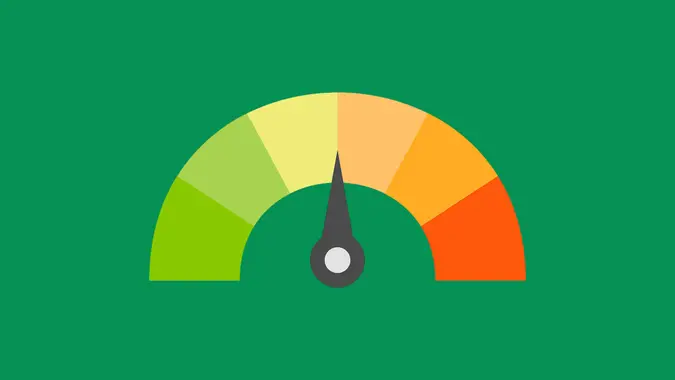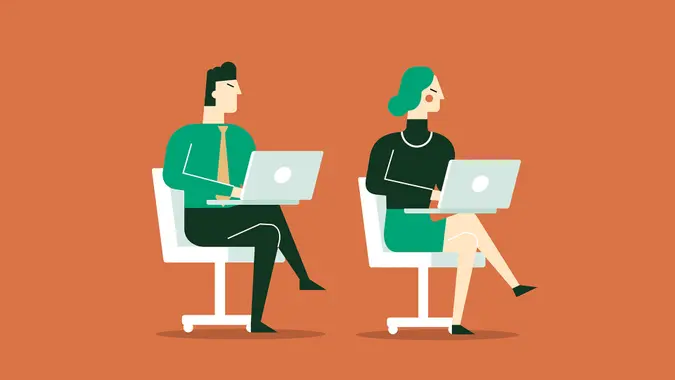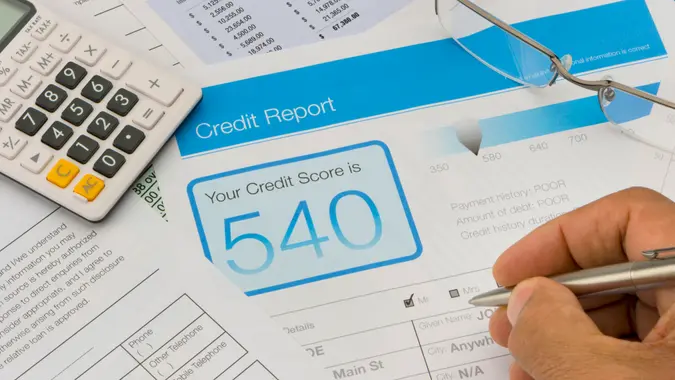What Is a Charge-Off? Meaning and How It Affects You

Commitment to Our Readers
GOBankingRates' editorial team is committed to bringing you unbiased reviews and information. We use data-driven methodologies to evaluate financial products and services - our reviews and ratings are not influenced by advertisers. You can read more about our editorial guidelines and our products and services review methodology.

20 Years
Helping You Live Richer

Reviewed
by Experts

Trusted by
Millions of Readers
A charge-off is an accounting term creditors use to mark a debt as unlikely to be paid and write it off as a loss. It doesn’t cancel the debt — you’re still legally obligated to pay it.
While a delinquent account simply means the borrower is late with payments, a charge-off is when they’re substantially behind. It’s considered worse than delinquent because the creditor has given up collecting the debt through the normal billing process.
When Does an Account Get Charged Off?
Charge-offs usually occur within 120 to 180 days of nonpayment. Here are some common scenarios that can lead to an account getting charged off:
- Job loss or reduced income
- Medical emergencies
- Mental health issues, like depression or anxiety
- Identity theft or fraud
- Lack of contact with the borrower after several missed payments
How Does a Charge-Off Affect Your Credit?
Since payment history makes up 35% of your FICO score, a charge-off (plus the late and missed payments leading up to it) can lower your score significantly.
A charge-off stays on your report for seven years from the date of your first payment that led to the charge-off. However, it usually affects your score less over time.
When applying for credit in the future, lenders often view charge-offs as a red flag. It suggests high-risk behavior with money and poor credit management. As a result, it can be more challenging to qualify for credit cards, loans, mortgages and even rentals in the future.
Do You Still Owe the Money on a Charged Off Account?
However, unless the debt is settled, paid or discharged in bankruptcy, you’re still responsible for the balance.
After charging off an account, a creditor may choose to:
- Sell it to a debt collection agency
- Assign it to a third-party collector
- Continue trying to collect the debt internally
If the debt goes to collections, you’ll have to contact and pay them instead of the original creditor. It might also show up separately from the original charge-off on your credit report, which means you’ll have two negative marks on your report.
Can You Remove a Charge-Off from Your Credit Report?
In most cases, you’ll have to wait seven years for the charge-off to fall off your credit report naturally. However, you may be able to dispute it if the information is incorrect or you don’t recognize the account.
If you find an inaccuracy, you can file a dispute with the credit bureaus reporting the incorrect information. Make sure to provide any documentation that supports your claim.
If the charge-off is legitimate, you might be able to negotiate a pay-for-delete agreement, meaning you offer to pay the debt with the condition that they remove the account from your credit report. However, it’s pretty rare for a creditor to agree to this.
How to Handle a Charge-Off and Rebuild Your Credit
Here’s what to do if you notice a charge-off on your credit report:
Step 1: Confirm the Charge-Off Details
First, you’ll want to verify the details of the charge-off. To do this, request a free copy of your credit report from all three credit bureaus (Equifax, Experian and TransUnion) through AnnualCreditReport.com.
Once you receive the reports, verify the following information:
- The amount owed
- The original creditor
- The date of first delinquency
- Whether the debt’s been sold or is still with the original creditor
Step 2: Decide Whether to Pay the Debt
Paying the debt won’t erase it from your credit report, but it could minimize the impact on your score. It also shows lenders that you’ve taken responsibility for the debt, which could help you get approved for credit in the future.
Some creditors may even settle the account for less than the full balance. Your credit report will show that you paid less than the amount owed, but that’s still better than the debt being completely unpaid.
You could also try negotiating a pay-to-delete agreement. However, it’s unlikely to work due to reporting requirements from the major credit reporting agencies.
Step 3: Work with the Creditor or Collection Agency
Once you decide whether you want to pay the debt or settle, you’ll need to contact the creditor.
If the debt is still with the original creditor, you can usually find their contact information on past billing statements or their official website. If the debt is with a collection agency, however, their phone number should be listed on your credit report.
When negotiating with the creditor, make sure to stay polite and professional. Ask whether you can settle for a lower balance, set up a payment plan or get the account deleted if possible.
Whatever solution you and the creditor decide on, make sure to get everything in writing to protect yourself legally and ensure they honor the agreement.
Step 4: Monitor Your Credit Report
After reaching an agreement with the creditor, check your credit report regularly for updates.
Creditors usually report to credit bureaus monthly, so it may take a few weeks to see the change reflected on your report.
If the status of the charge-off isn’t updated, you can contact the credit bureau reporting it and file a dispute. Make sure to include the written agreement you requested from the creditor as proof.
Preventing Charge-Offs in the Future
After learning what is a charge-off, you’ll want to try to prevent one in the future. Below are some tips on how you can avoid a charge-off:
- Set up auto-pay: If you have trouble remembering to pay your bills, you might benefit from enrolling in auto-pay. That way, when your bills come due, the creditor can take the money out of your account automatically.
- Schedule bill reminders: You can also set reminders on your calendar for when your bills are due. This might also help you with budgeting since you can see how much you owe and when.
- Avoid debt you can’t manage: Try not to take on more credit than you can realistically keep up with. When charging purchases to credit cards, make sure you have the funds to pay them off before the end of each statement cycle.
- Pay the minimum due: Even if you can’t pay off your full balance on your loan or credit card, you should at least pay the minimum amount due. Although you’ll still accrue interest, it will keep your account in good standing.
- Build an emergency fund: Keep at least three to six months of expenses in a savings account in case you have surprise expenses. An emergency fund can help you with your bills if something happens, like job loss or medical problems.
- Communicate with the lender: If you can’t make your payment, make sure to contact the creditor as soon as possible. Many offer options like deferment plans or hardship programs (make sure to request the solution in writing!).
FAQ
Here are the answers to some of the most frequently asked questions regarding exactly what is a charge off:- What is the difference between a charge-off and a collection?
- A charge-off is when the creditor gives up on collecting a debt through the normal billing process. A collection is when the creditor transfers the debt to a third party to try to collect the money.
- Can a charge-off be removed from my credit report?
- If the information is inaccurate or you negotiate a pay-for-delete agreement, you may be able to get a charge-off removed from your credit report. Otherwise, it will fall off after seven years.
- Will paying a charge-off improve my credit score?
- Paying a charge-off could slightly boost your credit score. However, it will also look better to future lenders if you take responsibility for the debt.
- How long does a charge-off stay on my credit report?
- Charge-offs fall off your credit report seven years from the first date you missed a payment (not the date it was charged off).
- Can I buy a house with a charge-off on my credit?
- A charge-off could affect your ability to buy a house since it could signal a lack of financial responsibility. However, paying or settling the debt might show lenders that you've changed the bad habits that hurt your credit score.
- Should I pay a charge-off or let it fall off my report?
- If you’re planning on applying for a loan soon, paying it could help your likelihood of approval. However, if you’re not looking for new credit and it’s close to falling off, it might make more sense to wait.
Editorial Note: This content is not provided by any entity covered in this article. Any opinions, analyses, reviews, ratings or recommendations expressed in this article are those of the author alone and have not been reviewed, approved or otherwise endorsed by any entity named in this article.
Our in-house research team and on-site financial experts work together to create content that’s accurate, impartial, and up to date. We fact-check every single statistic, quote and fact using trusted primary resources to make sure the information we provide is correct. You can learn more about GOBankingRates’ processes and standards in our editorial policy.
 Written by
Written by  Edited by
Edited by 























